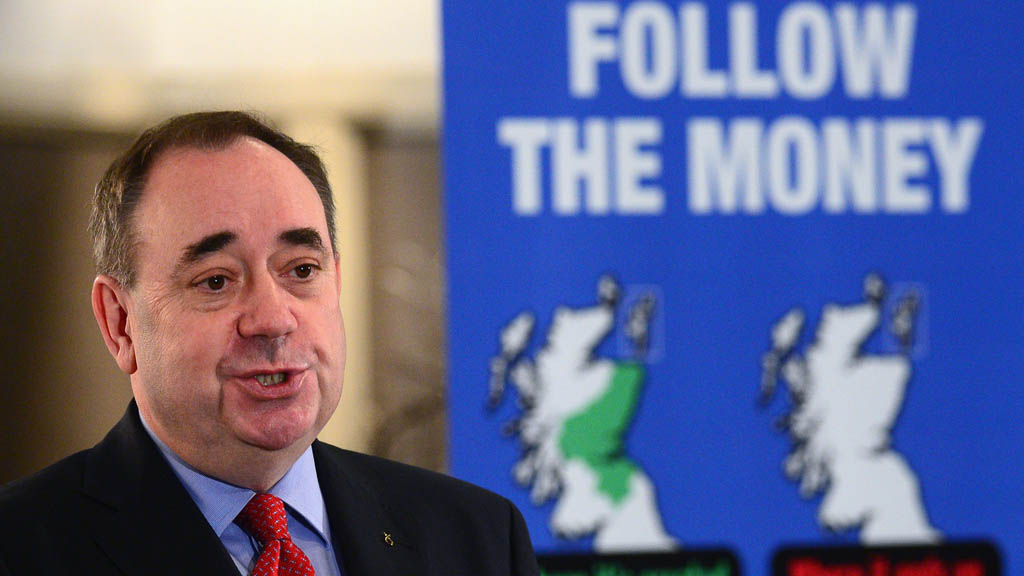Standard Life could move out of an independent Scotland
The argument for Scottish independence suffers a set-back as Standard Life says it could move away from the country in the event of a “Yes” vote, and RBS reports increased losses.

Standard Life, which has been based in Scotland for 189 years, said it could move parts of the business to England because of the uncertainty that would be created by an independent Scotland.
Chairman Gerry Grimstone said the pensions and savings firm wants clarity from politicians on material uncertainties such as what currency Scotland would use and whether agreement and ratification of an independent Scotland’s membership to the EU would be achieved in time.
“We will take whatever action we consider necessary – including transferring parts of our operations from Scotland – in order to ensure continuity and to protect the interests of our stakeholders,” he said in the company’s annual report on Thursday.
Standard Life Chief Executive David Nish said the company had started setting up registered companies in England, to which it could transfer some of its operations, “as a precautionary measure”.
However, Mr Nish added that the company would maintain a position of “strict political neutrality”.
Standard Life said operating profits were down 13 percent to £751m in the 12 months to 31 December 2013.
How Scottish is Standard Life?
The Life Insurance Company of Scotland was founded in Edinburgh in 1825. Its first premises were on the capital’s ancient Royal Mile, but as Edinburgh’s New Town developed, the business – renamed the Standard Life Assurance Company – expanded into increasingly grand offices in Edinburgh’s new banking district. It also began a move globally. Sales representative were first dispatched to Canada in 1833, and by the end of the nineteenth century, the business had offices on almost every continent. You could buy Standard Life insurance from Uruguay to South Africa, Shanghai to Bombay.
For the next 100 years, mergers and acquisitions around the world diluted some of the company’s distinct Scottishness, but Standard Life maintained its headquarters in Edinburgh – even after it demutualised in 2006 and listed on the London Stock Exchange. So how Scottish is the company now? Well it employs 9000 people worldwide, with two-thirds based in Scotland, but of its 6 million customers, less than 10 per cent are Scots.
RBS losses
Meanwhile the Royal Bank of Scotland has revealed an £8.2bn loss in 2013 compared with a £5.3bn loss in 2012.
The bank, 80 per cent owned by the British government, saw losses widen dramatically after taking a £3.8bn provision for a string of scandal-related charges and a £4.8bn hit for the creation of an internal “bad bank”.
Excluding these costs, RBS said it had made an operating profits of £2.5bn last year, 15 per cent lower than in 2012.
RBS Chief Executive Ross McEwan outlined a revival plan to make the bank “smaller, simpler and smarter” that will see it shrink from seven divisions to three and overhaul its service and products for retail customers – something that was welcomed by the Treasury.
Despite the losses, RBS revealed a £567m bonus pot for staff. The amount for bonuses is 15 per cent smaller than the one given in 2012.
Deputy Prime Minister Nick Clegg said RBS should only be entitled to pay staff whatever it wants when the bank is “standing on its own two feet.”
“A loss-making bank that is basically on a life-support system because of the generosity of British taxpayers shouldn’t be dishing out ever larger amounts of money in pay and bonuses,” he told ITV’s Daybreak.
“The overall amount has been coming down. It needs to continue to come down. They are entitled to pay their staff what they want when they are standing on their own two feet. At the moment they are not.”
Scottish leader Alex Salmond wants to pursue a monetary union with the rest of Britain, retaining the pound and the Bank of England as a lender of last resort, but the main political parties in Westminster have rejected this.
Last month, Mark Carney warned that Scotland would need to cede some of its national sovereignty in order to establish a currency union in the event of independence. He also unfavourably compared the size of the Scottish banking system with those in Iceland, Ireland and Portugal before their economic collapses.
-
Latest news
-
India’s ‘YouTube election’: Influencers enlisted to mobilise youth vote6m

-
Putin denies plans to capture Ukrainian city of Kharkiv3m

-
Plaid Cymru ends co-operation agreement with Welsh Labour government4m

-
Infected blood scandal: Government was warned years before taking action6m

-
Displaced in Gaza have to ‘start from Zero’ many times over, says Gaza NGO director3m

-




